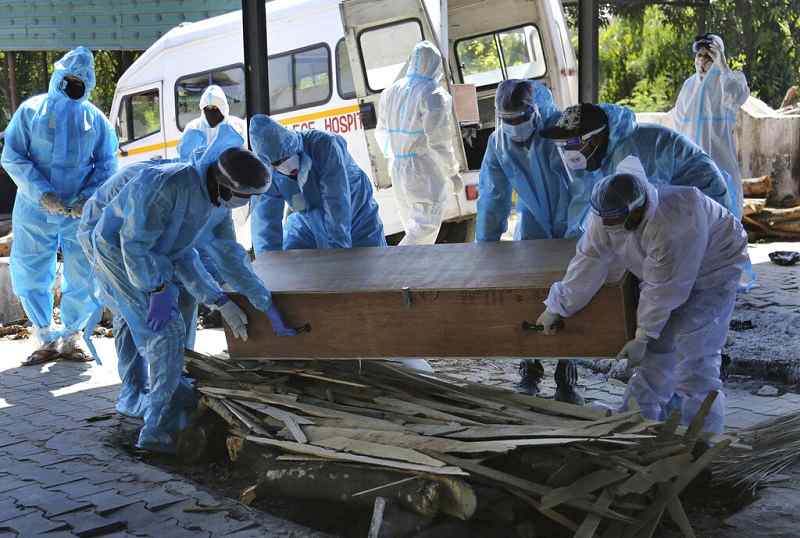
Health workers and relatives carry the body of a COVID-19 victim for cremation in Jammu, India, Sunday, April 25, 2021.
10:56 JST, May 6, 2022
LONDON (AP) — The World Health Organization estimates that nearly 15 million people were killed either by coronavirus or by its impact on overwhelmed health systems during the first two years of the pandemic, more than double the current official death toll of over 6 million.
Most of the deaths occurred in Southeast Asia, Europe and the Americas, according to a WHO report issued Thursday.
The U.N. health agency’s director-general, Tedros Adhanom Ghebreyesus, described the newly calculated figure as “sobering,” saying it should prompt countries to invest more in their capacities to quell future health emergencies.
WHO tasked scientists with determining the actual number of COVID-19 deaths between January 2020 and the end of last year. They estimated that between 13.3 million and 16.6 million people died either due to the coronavirus directly or because of factors somehow attributed to the pandemic’s impact on health systems, such as cancer patients who were unable to seek treatment when hospitals were full of COVID patients.
Based on that range, the scientists came up with an approximated total of 14.9 million.
The estimate was based on country-reported data and statistical modeling, but only about half of countries provided information. WHO said it wasn’t yet able to break down the data to distinguish between direct deaths from COVID-19 and those related to effects of the pandemic, but the agency plans a future project examining death certificates.
“This may seem like just a bean-counting exercise, but having these WHO numbers is so critical to understanding how we should combat future pandemics and continue to respond to this one,” said Dr. Albert Ko, an infectious diseases specialist at the Yale School of Public Health who was not linked to the WHO research.
For example, Ko said, South Korea’s decision to invest heavily in public health after it suffered a severe outbreak of MERS allowed it to escape COVID-19 with a per-capita death rate around a 20th of the one in the United States.
Accurately counting COVID-19 deaths has been problematic throughout the pandemic, as reports of confirmed cases represent only a fraction of the devastation wrought by the virus, largely because of limited testing. Government figures reported to WHO and a separate tally kept by Johns Hopkins University show more than 6.2 million reported virus deaths to date.
Scientists at the Institute of Health Metrics and Evaluation at the University of Washington calculated for a recent study published in the journal Lancet that there were more than 18 million COVID deaths from January 2020 to December 2021.
A team led by Canadian researchers estimated there were more than 3 million uncounted coronavirus deaths in India alone. WHO’s new analysis estimated that missed deaths in India alone ranged between 3.3 million to 6.5 million.
In a statement following the release of WHO’s data, India disputed the U.N. agency’s methodology. India’s Health and Family Welfare Ministry called the analysis and data collection methods “questionable” and complained that the new death estimates were released “without adequately addressing India’s concerns.”
Samira Asma, a senior WHO director, acknowledged that “numbers are sometimes controversial” and that all estimates are only an approximation of the virus’ catastrophic effects.
“It has become very obvious during the entire course of the pandemic, there have been data that is missing,” Asma told reporters during a press briefing on Thursday. “Basically, all of us were caught unprepared.”
Ko said the new figures from WHO might also explain some lingering mysteries about the pandemic, like why Africa appears to have been one of the least affected by the virus, despite its fragile health systems and low vaccination rates.
“Were the mortality rates so low because we couldn’t count the deaths, or was there some other factor to explain that?” he asked, citing the far higher mortality rates in the U.S. and Europe.
Dr. Bharat Pankhania, a public health specialist at Britain’s University of Exeter, said the world may never get close to measuring the true toll of COVID-19, particularly in poor countries.
“When you have a massive outbreak where people are dying in the streets because of a lack of oxygen, bodies were abandoned or people had to be cremated quickly because of cultural beliefs, we end up never knowing just how many people died,” he explained.
Pankhania said that while the estimated COVID-19 death toll still pales in comparison to the 1918 Spanish flu pandemic, which experts estimate caused up to 100 million deaths, the fact that so many people died despite the advances of modern medicine, including vaccines, is shameful.
He also warned that the cost of COVID-19 could be far more damaging in the long term, given the increasing burden of caring for people with long COVID.
“With the Spanish flu, there was the flu and then there were some (lung) illnesses people suffered, but that was it,” he said. “There was not an enduring immunological condition that we’re seeing right now with COVID.”
“We do not know the extent to which people with long COVID will have their lives cut short and if they will have repeated infections that will cause them even more problems,” Pankhania said.
Top Articles in News Services
-

Prudential Life Expected to Face Inspection over Fraud
-

Hong Kong Ex-Publisher Jimmy Lai’s Sentence Raises International Outcry as China Defends It
-

Japan’s Nikkei Stock Average Touches 58,000 as Yen, Jgbs Rally on Election Fallout (UPDATE 1)
-

Trump Names Former Federal Reserve Governor Warsh as the Next Fed Chair, Replacing Powell
-

Suzuki Overtakes Nissan as Japan’s Third‑Largest Automaker in 2025
JN ACCESS RANKING
-

Japan Institute to Use Domestic Commercial Optical Lattice Clock to Set Japan Standard Time
-

Israeli Ambassador to Japan Speaks about Japan’s Role in the Reconstruction of Gaza
-

Man Infected with Measles May Have Come in Contact with Many People in Tokyo, Went to Store, Restaurant Around When Symptoms Emerged
-

Prudential Life Insurance Plans to Fully Compensate for Damages Caused by Fraudulent Actions Without Waiting for Third-Party Committee Review
-

Woman with Measles Visited Hospital in Tokyo Multiple Times Before Being Diagnosed with Disease
























